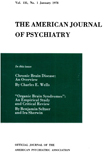PARENTAL DEVIANCE AND THE GENESIS OF SOCIOPATHIC PERSONALITY
Abstract
1. A 30-year follow-up study of 524 patients originally seen in a child guidance clinic yielded a high proportion ( 20%) of former patients who met criteria for a diagnosis of sociopathic personality as adults, as compared with a control group ( 2%). The 84 male patients with this diagnosis are compared, with respect to their parents' behavior problems, to male patients with other psychiatric diseases ( 166) and to male patients diagnosed as having no disease (75).
2. Most patients who met the criteria for a diagnosis of sociopathic personality at any time during their adult lives still showed marked antisocial behavior up to time of follow-up ( ages 31-54). For those in whom there was a marked diminution of symptoms, this most often occurred between the ages of 30-35. There was no age, however, beyond which one did not improve.
3. Various forms of parental behavior that could be considered rejection were investigated. No form of rejection specifically directed at the child was found to be associated with the development of sociopathic personality, if the child's provocative behavior is taken into account. Desertion, failure to supervise, and non-support were found to be positively associated with the disease. Father's coldness was found to be negatively associated.
4. Parents with a history of divorce were more likely to have sociopathic children than parents without divorce.
5. A picture of generalized antisocial behavior in the father, suggesting a diagnosis of sociopathic personality or alcoholism, was found to be related to sociopathic personality in the child. Whether or not children had actually lived with such fathers did not significantly affect their eventual rate of sociopathic personality.
Access content
To read the fulltext, please use one of the options below to sign in or purchase access.- Personal login
- Institutional Login
- Sign in via OpenAthens
- Register for access
-
Please login/register if you wish to pair your device and check access availability.
Not a subscriber?
PsychiatryOnline subscription options offer access to the DSM-5 library, books, journals, CME, and patient resources. This all-in-one virtual library provides psychiatrists and mental health professionals with key resources for diagnosis, treatment, research, and professional development.
Need more help? PsychiatryOnline Customer Service may be reached by emailing [email protected] or by calling 800-368-5777 (in the U.S.) or 703-907-7322 (outside the U.S.).



